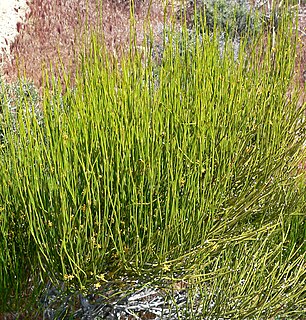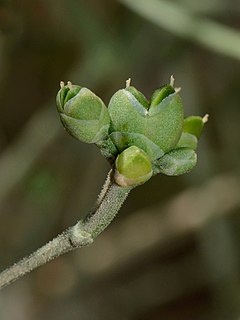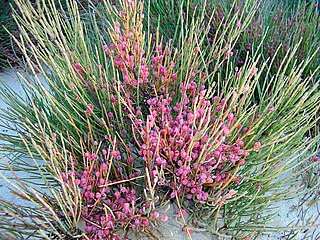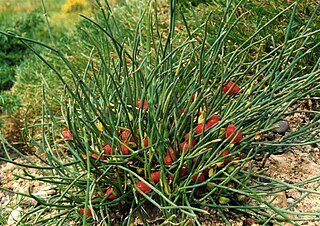
Haloxylon ammodendron, the saxaul, black saxaul, sometimes sacsaoul or saksaul, is a plant belonging to the family Amaranthaceae.

Quercus acutissima, the sawtooth oak, is an Asian species of oak native to China, Tibet, Korea, Japan, Indochina and the Himalayas. It is widely planted in many lands and has become naturalized in parts of North America.

Ephedra is a genus of gymnosperm shrubs. The various species of Ephedra are widespread in many arid regions of the world, ranging across southwestern North America, southern Europe, northern Africa, southwest and central Asia, northern China and western South America. It is the only extant genus in its family, Ephedraceae, and order, Ephedrales, and one of the three living members of the division Gnetophyta alongside Gnetum and Welwitschia.

Quercus variabilis, the Chinese cork oak, is a species of oak in the section Quercus sect. Cerris, native to a wide area of eastern Asia in southern, central, and eastern China, Taiwan, Japan, and Korea.

Picea schrenkiana, Schrenk's spruce, or Asian spruce, is a spruce native to the Tian Shan mountains of central Asia in western China (Xinjiang), Kazakhstan, and Kyrgyzstan. It grows at altitudes of 1,200–3,500 metres, usually in pure forests, sometimes mixed with the Tien Shan variety of Siberian fir. Its name was given in honour of Alexander von Schrenk (1816–1876).

Ephedra californica is a species of Ephedra, known by the common names California jointfir, California ephedra, desert tea, Mormon tea, and cañatillo.

Ephedra viridis, known by the common names green Mormon tea, green ephedra, and Indian tea, is a species of Ephedra. It is indigenous to the Western United States, where it is a member of varied scrub, woodland, desert, and open habitats. It grows at 900–2,300 metres (3,000–7,500 ft) elevations.
Ephedra alata is a species of Ephedra. These plants are perennial and xerophytic gymnosperm shrubs.
Ephedra przewalskii is a species of Ephedra that is native to Central Asia, Mongolia, Pakistan, and parts of China.

Ephedra strobilacea is a species of Ephedra that is native to Iran and Central Asia.
Ephedra multiflora is a species of Ephedra that is native to northern Chile and Northwest Argentina.

Ephedra torreyana, with common names Torrey's jointfir or Torrey's Mormon tea, is a species of Ephedra that is native to the deserts and scrublands of the Southwestern United States and to the State of Chihuahua and northern Mexico.
Ephedra lomatolepis is a species of Ephedra that is native to Kazakhstan and to the Tuva region of Siberia.
Ephedra cutleri, the Navajo ephedra or Cutler's jointfir, is a species of Ephedra that is native to the Southwestern United States.

Ephedra altissima is a species of Ephedra that is native to the western Sahara, and also to the Canary Islands.

Ephedra foliata is a species of gymnosperm in the Ephedraceae family. It is referred to by the common name shrubby horsetail. It is native to North Africa, and Southwest Asia, from Morocco and Mauritania east to Turkmenistan, Pakistan, and Punjab State in India.

Ephedra fragilis, commonly named the joint pine, is a species of Ephedra that is native to the western Mediterranean region of southern Europe and Northern Africa, and from Madeira and the Canary Islands in the Atlantic.

Ephedra monosperma, also called Ephedra minima or dan zi ma huang, is small shrub in the family of Ephedraceae.

Ephedra antisyphilitica is a plant species native to the southern Great Plains of the United States, and also to northeastern Mexico.
Erigeron oreades is an Asian species of flowering plants in the family Asteraceae. It grows on slopes and meadows in Xinjiang, Mongolia, Kazakhstan, and Siberia.















